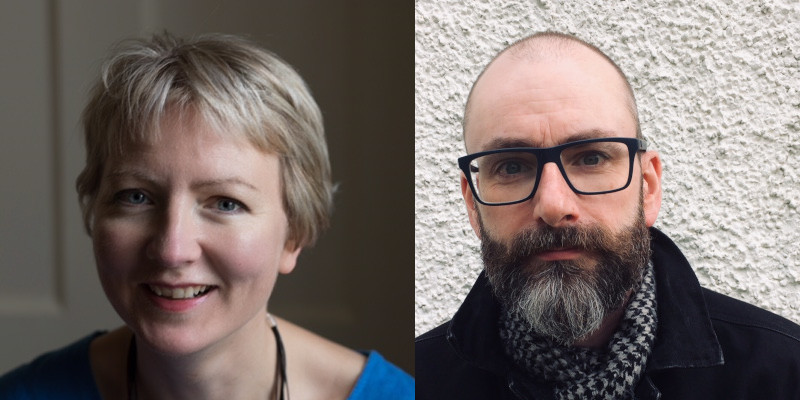At The Library of Mistakes – the career ups and downs of a playwright
“If you don’t make mistakes you’ll never make anything”
This oft repeated quote gets to the heart of the creative process. For instance, it often takes a number of appearances at the Fringe for performers to find their feet, to find their voice – and to get an audience of more than a handful.
The importance of learning from mistakes is the idea which has inspired one of Edinburgh’s more intriguing little institutions, The Library of Mistakes. The specific focus of the library’s collection is the world of finance and business. However, as Russell Napier, the Library Keeper, put it in his opening remarks, if they had called it the Library of Business and Finance, “no one would have come”. The Library of Mistakes, “a hub of research, intellectual curiosity and conviviality set in the historic New Town” is an intriguing name that draws interest.

The foundation of the library was inspired, in part, by the need to learn the lessons from the financial crisis of 2008 and examine the structural reasons behind it. What lies behind such moments are, as Napier commented, psychological factors such as herd mentality and confirmation bias. As Napier noted, these aspects are prevalent in many areas of life. Hence, the idea of inviting speakers from outside the finance and business spheres.
A writers’ practice
At the event, The Playwrights’ Hidden CV, playwrights Zinnie Harris and Douglas Maxwell talked about the parts of a writers’ practice that don’t always make the CV. Aspects not usually discussed in public settings. The event, organised in conjunction with Playwrights’ Studio, Scotland, consisted of a highly engaging exchange between the two speakers, before a Q&A. Time and again it was the making of mistakes and learning from them that was at the core of the discussion.
Such events can often lack focus. But here the speakers spoke in a way that resonated with many in the audience, whatever their background and profession. In particular, it had great relevance for anyone involved in any type of writing. The task of writing, whatever the genre, is a difficult craft, often involving severe psychological as well as technical challenges.
The speakers were not only experienced knowledgeable but were also superb public communicators, doing so with passion and thought. As one of the audience members noted, the speakers spoke with commendable openness, “showing vulnerability”. They did not shy away from the darker periods in their careers. Their initial themes were resilience and adaptability and how to attain these key qualities.

Resilience and adaptability
The speakers talked about their different routes into the world of playwriting and the mixed blessing of success. Maxwell had, over several years, sent off about 25 unsolicited scripts before he got his first commission. His perseverance had, ultimately paid off, though Maxwell warned against writers bombarding editors, commissioners etc. (“do what I say, not what I do!”)
In contrast, Harris was already involved in the theatre world. She became frustrated being involved in the production of other people’s plays and set herself the task of writing her own. Her first ever play was commissioned. However, this led to a period of crisis as she tried to live up to this and actually complete the project. This, she believes, led to the health issues she suffered for over six months, though this period of enforced inaction inspired her to create. “I was thinking up ideas as I lay there”.
After his first commission Maxwell had a period of sudden success, as plays “burst out” of him. This rich seam carried him forward for several years, until severe self-doubt struck him. “I didn’t know how I had done it”. A successful commission for the EIF led to a “public disaster” as the limitations of the work became abundantly clear on its first performance. Admitted that frankly he “had no idea what it was about”.
In the space of a few weeks he went “from hot shot to laughing stock”. He had to go back and analyse what he’d done. He went back to sending unsolicited plays, fearful that some of his work was being accepted purely because his name was on it. This was how he dealt with the “millstone of success” and the creative cul-de-sac he’d got into. What do writers need to get out of such situations?
Cheerleaders
For Zinnie Harris it was crucial that creatives built up supportive voices to help balance the internal critic always chirping away on your shoulder. They need to “activate” their “external advocates”. Those people who can help you “zoom out and see what you can’t see”; people who will see what you have achieved, not what is lacking. Eventually, creatives need to internalise these cheerleaders, helping you get through the inevitable periods of crisis and self-doubt.
For both, finding your authentic voice takes time but is absolutely fundamental to good work. They should follow Dolly Parton’s suggestion to “find out who you are and do it on purpose”. In short, becoming conscious about what type of writer you are and not trying to emulate others. Both speakers were aware that the voice in their writing was now so well defined that it could be spoofed or emulated by AI.
The creative craft
Both also emphasised the importance of creatives remaining playful in their art, as well as being conscious of craft. That, as they develop, writers should become more conscious that they do possess genuine expertise, borne of many thousands of hours of writing, thinking and redrafting. It is “repetitive trying” that is the heart of the creative process, not the very limited number of inspired moments.
Sometimes, the abilities writers possess only become evident when they come to teach or to mentor others. Both speakers had discovered this when teaching and mentoring younger writers. By becoming conscious of their own craft, they will be able to pass on nuggets, as well as spot limitations in the works of others. One piece of advice that both emphasised was not to get trapped in a piece of work, not stuck with the same project for many years. It was important to put some work aside and to diversify into other types of activity and writing.
Zinnie Harris had diversified into writing for television, including for the BBC spy series Spooks. This had been a rather intense period of her career (“TV is bloomin hard”). The lesson she drew from this was the need to maintain some degree of creative control. In television there are so many voices (from the channel, from the production company etc) offering ‘notes’, that the script soon becomes incoherent through excessive drafting. She talked of doing 9 drafts in a very short period of time, before finally convincing the producers that the second draft was the best.

Playing out your fears
Asked by a member of the audience whether he was optimistic, Maxwell gave an interesting response. Broadly he was optimistic about the future of Scottish Theatre, seeing great potential in some of the younger playwrights he had come across. He also hopes that Glasgow’s Citizens Theatre can re-emerge as a focal point.
At a personal level, Maxwell felt that his general sense of optimism and balance was a product of his artistic endeavours. It was in his art that he often worked out his emotions and stress. That being a playwright offered him a canvas on which to “play out my darkest fears”. This is something that many artists refer to – of the healing potential of art. When looking at some of the darker aspects of his work Maxwell often wonders “what if I let that play out in real life?!” He did admit to having darker moods at times but these often emerged on days when he struggled to produce good work. Maxwell has begun to keep a diary, keeping track of the ups and downs of the process.
Reading downhill
How does a playwright or any writer know they are producing good work? For Maxwell, this often becomes evident when reading out his work aloud. He genuinely leaves his drafts for a while and when he returns to them, he looks at how well they flow. They should in his words, “read downhill” with an effortless momentum. If not, the places where the flow falters are those areas to cut or alter. In similar fashion, a read through with actors will often reveal areas where the writing could be tighter. Sometimes, the reaction certain lines get leads him to cut material that he is proud of, but gets in the way of the flow. As a writer, this can be painful but, as Maxwell noted, such lines and ideas can always be reused. Most writers do a lot of this ‘repurposing’.
With the wealth of creative activity going on in Edinburgh at present, The Playwrights’ Hidden CV was a highly insightful peek into the day to day life of those who produce such work.